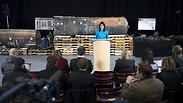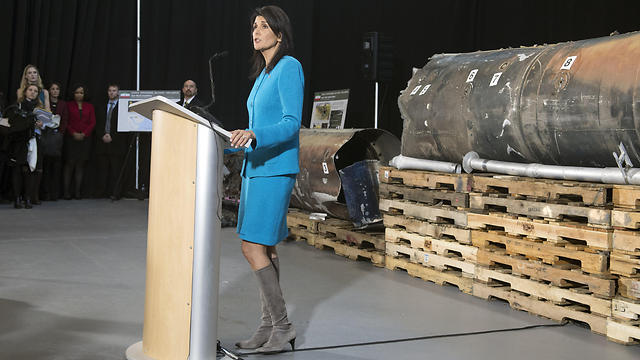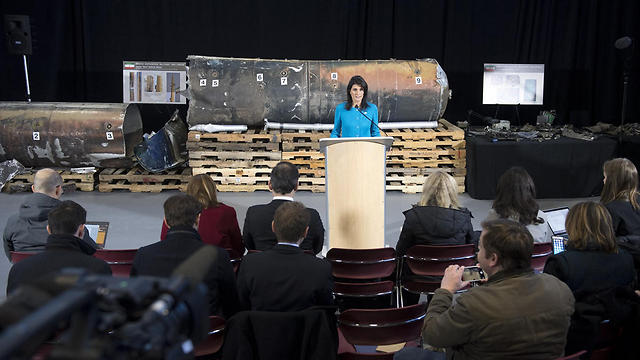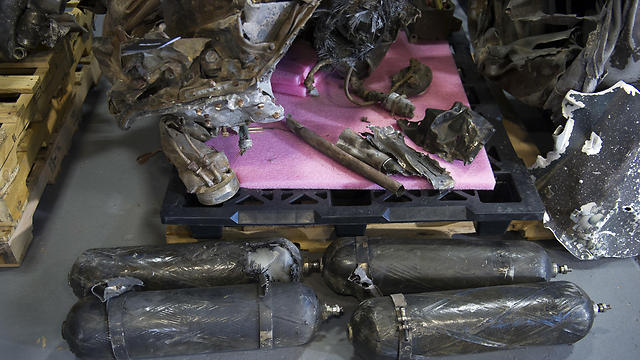
Yemen's Houthis say US's missile charges a distraction from Jerusalem decision
After Trump's UN Envoy Nikki Haley presents 'undeniable' evidence that Iran supplied missiles fired at Saudi Arabia by Houthi rebels, group claims US wants 'to give Arabs a story to divert their attention from Jerusalem. Instead of being angry at Israel, they wave the Iranian bogey.'
"After three years of war, America suddenly finds evidence that Iran supports the Houthis," Abdel-Malek al-Ejri said in a message on his Twitter account.
"America did not find any evidence in all the missiles fired from Yemen until now. The story is clear. They want to give Arabs a story to divert their attention from Jerusalem. Instead of being angry at Israel, they wave the Iranian bogey," he added.
The comments came after the United States envoy to the United Nations Nikki Haley on Thursday presented for the first time pieces of what it said were Iranian weapons supplied to the Iran-aligned Houthis, describing it as "undeniable" evidence that Tehran was violating UN resolutions.
Iran has denied supplying the Houthis with such weaponry and on Thursday described the arms displayed as "fabricated."
Haley came to an emptied-out hangar at a military base not far from the US Capitol, where fragments recovered from missiles launched from Yemen were paraded before reporters. Haley said the truck-sized missile segment behind her had been launched at the international airport in Riyadh, Saudi Arabia, and "led the US intelligence community to conclude unequivocally that these weapons were supplied by the Iranian regime."
"This is absolutely terrifying," said Haley, one of the Trump administration's most vocal critics of Iran. "Just imagine if this missile had been launched at Dulles Airport or JFK, or the airports in Paris, London or Berlin. That's what we're talking about here."
The newly declassified evidence marked the most aggressive US effort to date to substantiate its claim that Iran funnels weapons to the Houthis, an allegation widely accepted by most countries but that Tehran steadfastly denies. It comes as the Trump administration seeks to rally the world to punish Iran for its ballistic missile program and other worrying activities, despite backing away from the 2015 nuclear deal.
World powers that joined the US in brokering that deal have voiced frustration at Trump's moves to "decertify" Iran's compliance with the deal as a prelude to renegotiating it. The Obama-era deal rolled back Iran's nuclear program in exchange for billions in sanctions relief, but did not address Iran's missile-building or support for militant groups in the Middle East.
Other critics of the deal, including Prime Minister Benjamin Netanyahu, say that the deal only postpones Iran's path to the nuclear bomb, but it does not block it.
"Everyone has focused on the nuclear deal, and Iran has hidden behind the nuclear deal," Haley said. Gesturing to the missiles, she said, "These are the things they're doing while we're all looking the other way."
Haley and other officials said there were two reasons the US knew the missiles could have only come from Iran.
Some have specific markings indicating they were manufactured in Iran. One shredded piece of metal displayed to reporters bore the logo of Shahid Bakeri Industrial Group, an Iranian defense entity under US sanctions.
Others have specific technical characteristics, such as a certain valve, that only Iranian missiles have—"Iranian missile fingerprints," Haley said. One short-range ballistic missile fragment lacked large stabilizer fins that are common to that class of missile. The only known short-range ballistic missiles that don't have those fins are Iran's Qiam missiles, Haley said.
"The weapons might as well have had 'Made in Iran' stickers," Haley quipped.
Not so, said Iran's government, standing behind its assertion that Iran hasn't sent any missiles to Yemen, where Shiite Houthi rebels aligned with Iran have taken over much of the country. Iran's envoy to UN, Gholamali Khoshroo, said it was "fake and fabricated" evidence that illustrates America's "irresponsible, destructive and provocative role" in the region, according to a statement carried by Iran's official IRNA news agency.
Haley argued that Iranian weapons shipments violated several UN Security Council resolutions, including the one that enshrined the 2015 nuclear deal. International legal experts have debated whether the allegation, if true, constitutes a clear-cut violation.
Either way, Haley did not articulate any specific steps the US or other nations could take against Iran as a result of the evidence, which was included in a report to the UN secretary-general. But Haley said the US would be working with other countries on "next steps." She added that US lawmakers and delegations from foreign nations would be invited to view the missiles firsthand.
The US acknowledged it couldn't account for the full chain of custody, such as how the missiles got into Yemen—an admission that suggests there are still holes in the US intelligence.
"We do not know when they were transported exactly," said Defense Department spokeswoman Laura Seal.
Even so, Haley's presentation was roundly cheered by Iran's enemies, including Israel, the United Arab Emirates and Saudi Arabia. With US support, a Saudi-led coalition has been fighting the Houthis on behalf of Yemen's internationally recognized government. The civil war has turned Yemen, the Arab world's poorest nation, into a proxy battleground for Sunni-led Saudi Arabia and Shiite-led Iran.
The Associated Press and Reuters contributed to this report.













